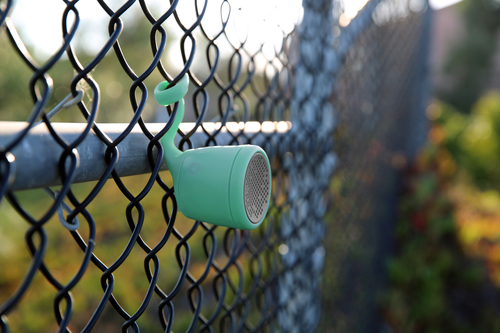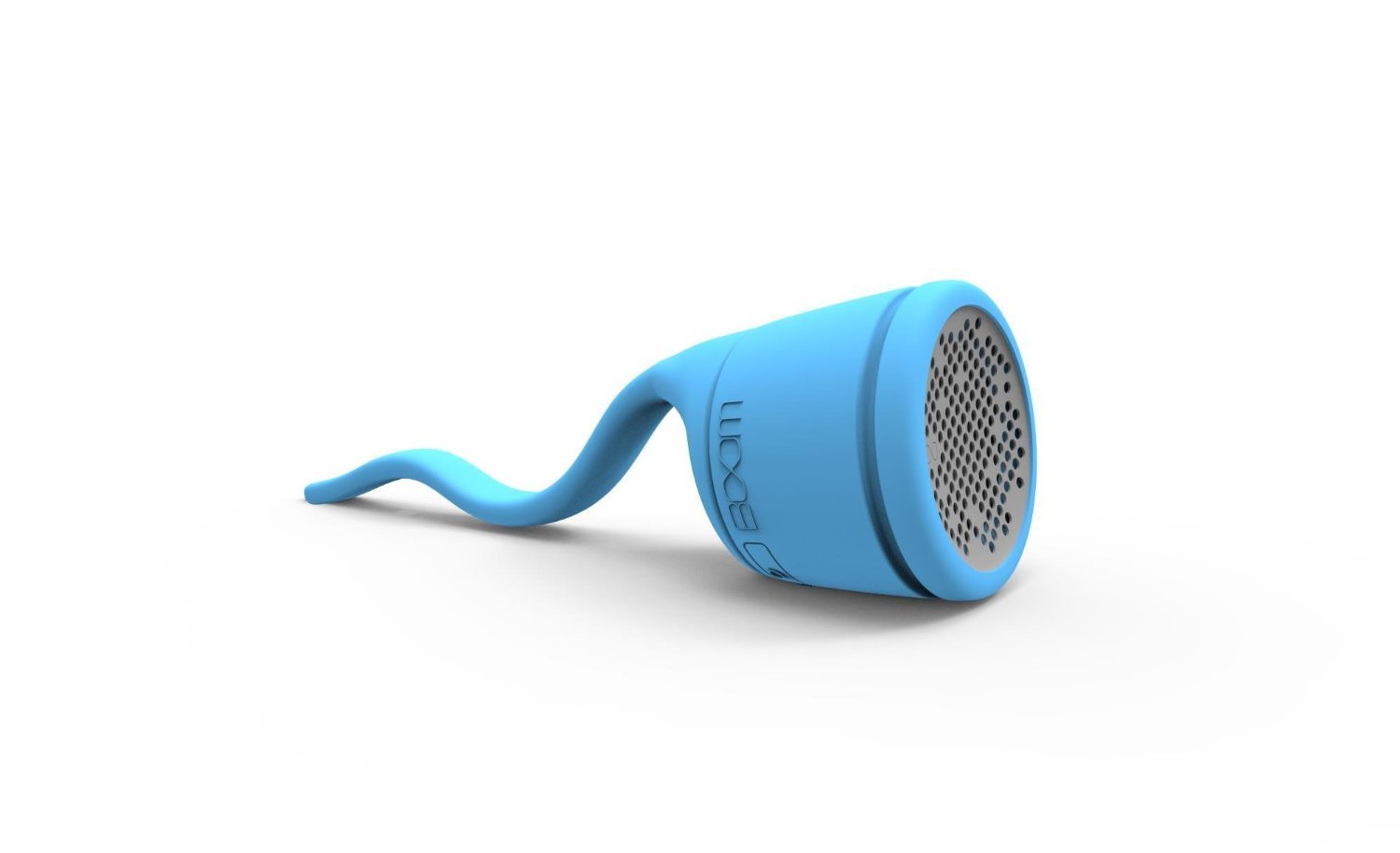Tom's Guide Verdict
Boom's rugged, flexible and waterproof Swimmer Bluetooth speaker can go everywhere, but the sound quality doesn't impress.
Pros
- +
Attaches to about anything
- +
Waterproof
- +
Good battery life
Cons
- -
Poor sound quality
Why you can trust Tom's Guide
The appeal of an ultraportable Bluetooth speaker comes from more than just how it sounds. It's about where you can take the device. Few can match Boom's $60 Swimmer for flexibility — literally. The design is not just waterproof, but also comes with a tail you can wrap around other objects. Add in long battery life, and the Swimmer looks like a winner. But mediocre sound quality has this speaker treading water.
Design
By itself, the 5.5 x 3.75 x 3.125-inch Swimmer is a tough, though pretty simple looking ultraportable speaker. Boom encases the Swimmer's single, 1.75-inch driver in rubber that protects it from drops. And there's more to it than that — with an IPX7 rating, you can submerge the Swimmer in 3 feet of water for up to 30 minutes without causing harm.
But it's the Swimmer's flexible tail attachment that really sets it apart from other ultraportables. While JBL's Clip comes with an integrated carabiner that conveniently hangs from a backpack or belt loop, the Swimmer's tail can curl into a wide variety of shapes. I fashioned the tail into a hook to hang the Swimmer from my monitor, coiled it into a stand so the speaker could sit on my table and looped the tail around my backpack. If you need more-secure adhesion to a surface, you can swap out the tail for the included suction-cup bottom.
MORE: Best Bluetooth Speakers
While the attachments give the Swimmer great flexibility, they also make it hard to access the auxiliary input and the microUSB port for charging. You have to remove the attachment to get to either port.
You can order the Swimmer in gray, white, green, blue, or red. I tested the white model.
The speaker offers minimal buttons and indicators. You get a power button and a Bluetooth pairing activator, and can control volume as well as play and pause music. A small light indicates when you are paired and turns red when the power is low. The Swimmer uses voice prompts for other status updates; the voice is quite loud, and you can't turn it down — a negative when you're in an office or other shared setting.

Setup and Use
I connected the Swimmer easily with iOS and Android devices via Bluetooth. To put the speaker into discovery mode, press the Bluetooth symbol on the side. A voice alert says "pairing," and the blue indicator light on the side of the speaker blinks until it pairs with your mobile device.
On an Android device, go to Settings and look for the speaker listed in Available Devices. (You may need to touch Search for Devices.) In iOS, go to Settings > Bluetooth, where the Boom Swimmer should appear under Devices.
Boom says the Swimmer's transmission range is 33 feet, and I found that to be accurate. The speaker even maintained a strong connection despite the walls between my iPhone and the speaker, which other Bluetooth speakers struggle to do.
MORE: Our Favorite Soundbar Speakers
Audio Performance
While the Swimmer excels in design, it falls short of competitors in audio quality across all genres. Seventies' glam rock band Big Star's "In the Street" sounded harsh and tinny instead of bright and powerful; Beck's acoustic guitar on "Heart Is a Drum" lacked the crispness that it had through other speakers. While Lorde's vocals on "Team" resonated well enough, the thumping bass-line underneath lacked oomph. In comparison, JBL's Clip delivers much better fidelity, especially in the treble tones.
Boom suggests that using the suction cup attachment rather than the tail improves bass response — likely by taking advantage of the sound-conducting qualities of the surface to which the speaker is attached — but I heard only a minor improvement.
I did hear improved bass when I turned the volume up, and the Swimmer can get pretty loud. It maxed it out at 85 dBs in my testing, which is also the highest safe level of listening. But at that volume, the sound suffered from some distortion. JBL's Clip gets louder with less distortion.
Battery Life and Charging
The Swimmer doesn't tire easily. Unlike the JBL Clip, which lasts only 5 hours on a full charge, the Swimmer says it can play at 50-percent volume for 16 hours (8 hours at full volume). I found this to be accurate; in more than 10 hours of use over several days, the indicator light never turned red to indicate low battery. That's better than many $200 Bluetooth speakers.
When you do need to charge the speaker, it recharges through its microUSB port. As I mentioned, the port is under the tail or suction-cup attachment, so you have to remove that element to charge the speaker — definitely an inconvenience.
Bottom Lin
If you're looking for a true "take it everywhere" ultraportable Bluetooth speaker, the Swimmer fits the bill — as long as you don't crave high fidelity. With its flexible tail attachment, the speaker can hook onto just about anything, and its weatherproofing makes it more durable than similar speakers. If you want better sound and can do without long battery life, the JBL Clip is the choice for you. However, the portability, durability and longevity of the Boom Swimmer make it worth a look for those on the go.
Specs:
Speakers: 1 x 1.75-inch driver
Size: 5.5 x 3.75 x 3.125 inches
Weight: 13 ounces
Inputs: Bluetooth, 3.5mm auxiliary input

Michael Gowan is a freelance technology journalist covering soundbars, TVs, and wireless speakers of all kinds of shapes and sizes for Tom’s Guide. He has written hundreds of product reviews, focusing on sound quality and value to help shoppers make informed buying decisions. Micheal has written about music and consumer technology for more than 25 years. His work has appeared in publications including CNN, Wired, Men’s Journal, PC World and Macworld. When Michael’s not reviewing speakers, he’s probably listening to one anyway.

